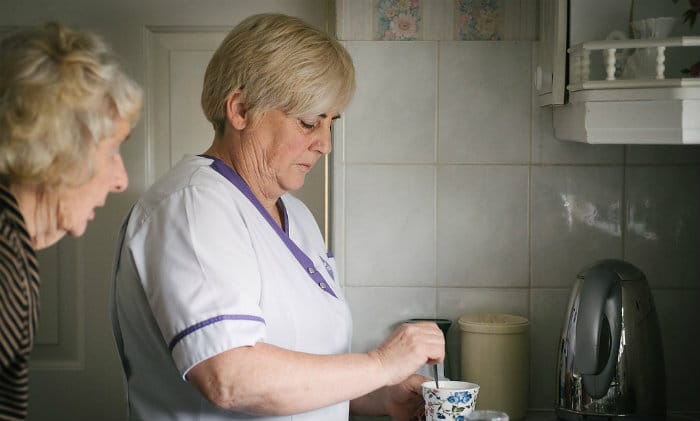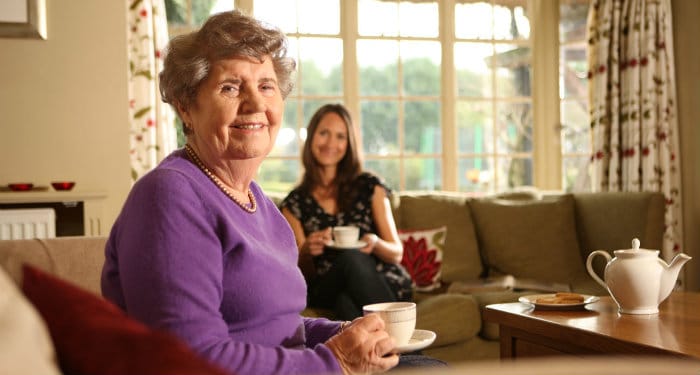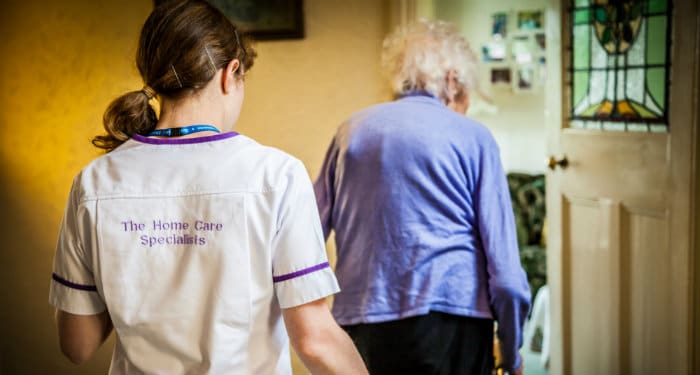Taking the time to understand your loved one’s needs and placing them at the centre of the decision-making process can make your next steps much smoother. Whether you’re looking for 30 minutes or 30 hours of care per week, domiciliary care in Bristol is a great option for those looking for extra support in the place you feel most comfortable – at home.
No task is too little or too big, from changing the bed sheets to toiletry and personal care, plans can be tailored around you and your loved one. Domiciliary care is an increasingly popular choice for those wanting to retain their independence and receive a flexible level of support when they need it most.

“Patricia has been a very calm, kind and responsible carer who clearly had my sister’s interests and well-being at the forefront of her mind. We are grateful to her and Helping Hands for making our lives better in difficult circumstances” – Caroline
What does domiciliary care involve?
You may now be thinking, what is domiciliary care and what’s the difference between domiciliary care and visiting care? Well, there’s no difference (apart from the name), they both offer a service whereby you receive care in your or your loved one’s home, the service can be for two hours per day, once a month, or a set time and duration daily – the choice is yours.
From an occasional companionship visit for regular company, transport to attend appointments, support with household duties or personal care, such as bathing, medication assistance and meal preparation, domiciliary care provides support for the whole family.

When should you consider domiciliary care?
Your need for help might change suddenly, as a result of an illness or fall, or your situation may have been changing gradually over time. If you’re unsure, you might want to consider home care if:
- You’re finding it difficult to cope with daily routines, including washing, dressing, or getting out and about
- Your home still meets your needs and is suitable and safe for you to continue living in (or can be adapted to suit your requirements)
- You don’t want to move into a residential care home
Whatever the reason, if you’re considering care at home, the first step is to book a care assessment. By booking a home visit, you’ll be able to discuss your care options with an advisor, that way you’ll be aware of all options available.
Here’s how Molly found domiciliary care…
Molly has been receiving domiciliary care from Helping Hands for two years with the carers visiting twice daily every day, helping with tasks such as washing, dressing and prompting of medication. Unfortunately, Molly had a fall, breaking her femur, which left her unable to weight-bear for short periods of time and unable to walk.
Molly felt that she needed to increase the frequency of her support, particularly because her husband’s frail and unable to assist with all the care tasks now required.
After talking to her social worker and Helping Hand’s Care Manager, an assessor from Helping Hands visited Molly to discuss the care support she needed. Not only did the assessor focus on the practical care required but also the experience and personality of the carer as Helping Hands understand how important it is that the carer fits in well with the client and their home.
After the assessment, Molly received the profile of Joan, who has worked as a carer for Helping Hands for four years.
Molly added ‘Having the support of Joan and knowing that she is there for us is a great relief for both myself and my family. Not only is Joan a great carer but she also cooks us our favourite meals, we are very lucky to have her’.

Where to look for domiciliary care in Bristol and things to consider…
If living at home is a priority for you or your loved one, choosing a local, flexible and reliable care service is key. Whether you’re looking for home care in Filton, Bradley Stoke, Pucklechurch, Kingswood and the surrounding areas, Helping Hands’ domiciliary carers can provide you with all levels of support, at any time of day, wherever you are in Bristol.
Ensuring the carers you have in mind are fully qualified and trained is key, after all, they’ll be caring in your home, with your loved one – rest assured, were fully regulated and approved by the Care Quality Commission. Plus, we have plenty of amazing reviews for you to read.
